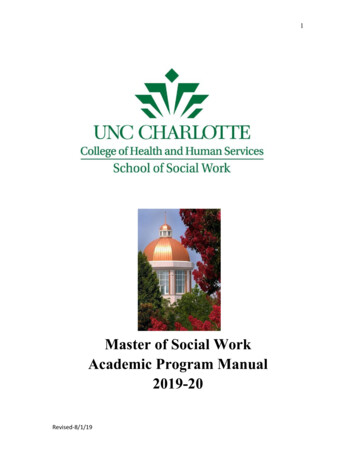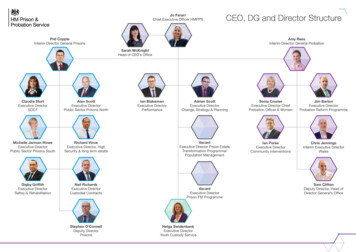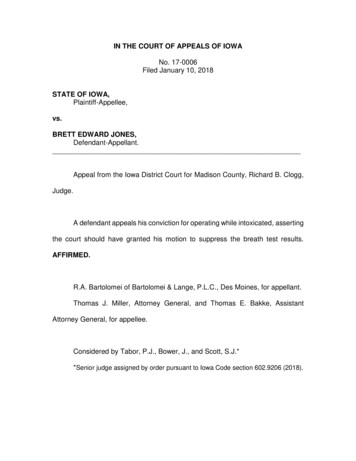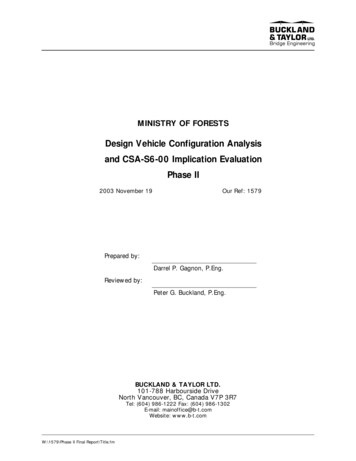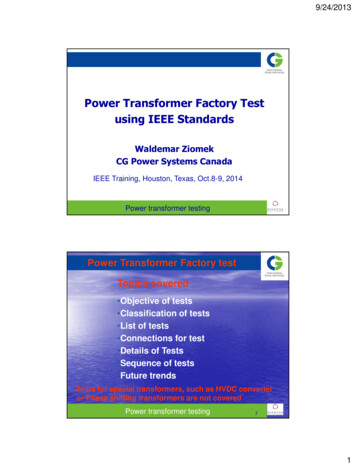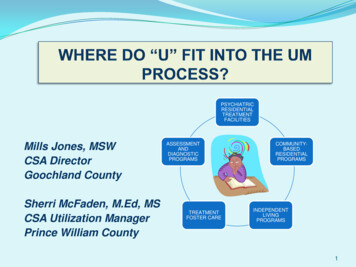
Transcription
PSYCHIATRICRESIDENTIALTREATMENTFACILITIESMills Jones, MSWCSA DirectorGoochland CountySherri McFaden, M.Ed, MSCSA Utilization ManagerPrince William ER VINGPROGRAMS1
PRINCE WILLIAMCOUNTY CSACSA Staff: 1 CSA Director2 UM Coordinators2 Admin StaffBudget: 7.5MMarch 20132
GOOCHLAND COUNTY CSACSA Staff: CSA DirectorBudget: 750,000March 20133
CSA POPULATIONGoochlandPrince WilliamResidential Treatment Centers343Community-Based Residential117Treatment Foster Care66Family Foster Care2089SPED Private Day625CSA Other0475 Total Youths Served36 700 March 20134
OBJECTIVES Utilization Management DefinitionRole of Case ManagerRole of UM CSA Identify Different Levels Of Service For Youth and Their Families Psychiatric Residential Treatment FacilitiesCommunity-Based Residential ProgramsAssessment and Diagnostic ProgramsIndependent Living ProgramsTreatment Foster Care Become Familiar With Basic Standards Of Service For Providers Review Basic Service Requirements Identify Key Areas To Evaluate Service Quality5
UTILIZATION MANAGEMENTDefinition:THE EVALUATION OF ALL SERVICES CONSIDERED,APPROVED, AND PROVIDEDFAPTsQA & COMPLIANCE WITHSTATE AND LOCAL POLICIESAND PROCEDURESCASEMGRsCPMTsUMCLIENTSPROVIDERS6
UTILIZATION MANAGEMENTSUPERVISETHESERVICESPROVIDED TOTHE YOUTHINTERFACEWITH CLIENTS– PARENTS,GUARDIANS &YOUTHPROVIDE INPUTDURING THETREATMENTTEAM MEETINGCASEMANAGERADDRESSISSUES WITHSERVICEDELIVERYCOORDINATEWITH CSA, UMCOORDINATOR,FAPTEVALUATETHE NEEDFORCONTINUEDSERVICES7
LIST OF UM ACTIVITIESOUTCOME MEASURESTx. TEAM MTGSNEEDS VS. SERVICESPAPER REVIEWCANSCONRECORDSMEDICAIDVEMAT“DO THEY MATCH?”REVIEW REPORTSLIAISON BETWEENPROVIDERSAND CASE MANAGERSFAPTSSITE VISITSCASE STAFFING8
UTILIZATION MANAGEMENTQUESTIONS FOR ALL LEVELS OF SERVICE Are Goals And Services Specific To The Needs Of The Youth? Does The Discharge Plan Match The FAPT/Court Approved Plan And Lead To AStep-Down To A Lower Level Of Care? Is The Family Actively Involved In Treatment Planning And Service Provision?(Treatment Teams, Staffing, Etc). Is The Youth Making Progress Towards Meeting The Criteria For Completing Their Goals? What Is The Program Doing To Help The Youth Reach Their Goals? If The Youth Is Not Making Progress, What Program Changes Will Be Made ToAssist The Youth To Get On Track? Is The Discharge Plan Realistic – Not Based On Program Length?9
UTILIZATION MANAGEMENTSUPPORTTHE CASEMANAGEROPTIMIZETHE USE OFMEDICAIDAND ENCASE MGRSANDPROVIDERSMAINTAINQUALITYCONTROL10
PSYCHIATRIC RESIDENTIALTREATMENT FACILITIES11
PSYCHIATRIC RESIDENTIAL TREATMENT FACILITIESEXAMPLESProgram DesignsHouse StyleCampus StylePsych Facility (locked)Psych facility w/ acuteProvider ExamplesFair WindsUMFSHallmarkPoplar Springs* Education Services Provided on-site *FOR MORE INFORMATION SEE:12
PSYCHIATRIC RESIDENTIAL TREATMENT FACILITIESINPUTSCASE MANAGERFAPTYOUTHYOUTH’S PARENTSLEGAL GUARDIANSOTHER RESPONSIBLE PARTIESCOMPLETED BY THE 14TH DAYAFTER ADMISSIONCOMPREHENSIVEPLAN OF CAREINITIAL PLAN OF CARE(COMPLETED AT ADMISSION)13
PSYCHIATRIC RESIDENTIAL TREATMENT FACILITIES Therapy –21 sessions/week Family Therapy-Minimum ESDISCHARGE PLANNING* Case Manager should address theissue if family is not participating in therapy * Discharge Planning: Active treatment andcomprehensive planning for aftercare services.Planning for discharge, placement, and treatmentmust begin at admission.14
PSYCHIATRIC RESIDENTIAL TREATMENT FACILITIES Treatment Plan Reviews: The treatment plan must beupdated every 30 days and revised to address goalsachieved, unresolved problems, and any new problemswhich have arisen.PARTICIPANTSRTC STAFFCSA CASE MANAGERYOUTHFAMILYUM COORDINATOR/CSA participate in treatment planning conduct on-site visits review youth’s charts conduct interviews address issues15
PSYCHIATRIC RESIDENTIAL TREATMENT FACILITIESTHERAPEUTIC PASSES Therapeutic passes are permitted if the goals of the pass is partof the master treatment plan. The goals of a particular visit mustbe documented prior to granting the pass and, on return, itseffects must be documented. Passes should begin with short lengths of time (e.g., 2-4 hours)and progress to a day pass. The function of the pass is toassess the recipient’s ability to function outside the structuredenvironment and to function appropriately within the family andcommunity. Overnight passes may occur only after the completion anddocumentation of successful day passes and as a part of thedischarge plan. No more than 18 days of therapeutic leaveannually are billable. Days of leave are counted from the date ofadmission to Medicaid-covered service.16
PSYCHIATRIC RESIDENTIAL TREATMENT FACILITIESUTILIZATION REVIEWSPECIFIC QUESTIONS TO ASK ARE THE YOUTH AND FAMILY ACTIVELY PARTICIPATING IN THERAPY? ARE THE EDUCATIONAL SERVICES FOLLOWING THE IEP? WHAT IS THE STATUS OF YOUTH’S MEDICAID? IS THERE ADEQUATE COMMUNICATION WITH THE REFERRAL SOURCE? IS THE FACILITY SAFE AND CLEAN? WHAT ACTIONS WERE TAKEN AND ARE PLANNED THAT SUPPORTTHE DISCHARGE PLAN?17
ASSESSMENT AND DIAGNOSTIC PROGRAMS18
ASSESSMENT AND DIAGNOSTIC PROGRAMSOVERVIEW 30-90 day program designed to assess the emotional,behavioral, educational, and medical needs of youth. Designed for youth new to care or youth who have notresponded well to traditional interventions (e.g. Therapy,Intensive In-Home Services, Medication Management). Program should respond to the needs of the youth (and family).ASSESSMENTNEEDSPROGRAM DESIGN AND DELIVERY19
ASSESSMENT AND DIAGNOSTIC PROGRAMSEXAMPLESRESIDENTIALGrafton, North SpringNewport News Beh. CtrResidential cost may beMedicaid reimbursedGROUP HOMEKids in FocusIntercept - Fresh StartPartial Medicaidreimbursement20
ASSESSMENT AND DIAGNOSTIC PROGRAMSUTILIZATIONREVIEWUTILIZATIONREVIEW - WHATTO ASSESS?SPECIFIC QUESTIONS TO ASK Are The Program’s Recommendations Congruent With YourCSA Policies, Practices, And Fiscal Resources? Is The Recommendation Youth Specific? If So, Are The Case Manager And FAPT Providing The AppropriateServices For The Youth And Family? If Not, Are The Case Manager And FAPT Providing AppropriateJustification For Alternative Services? Are The Alternative Services Addressing The Youth’s Needs?21
COMMUNITY-BASED RESIDENTIAL PROGRAMSGROUP HOMES22
COMMUNITY - BASED RESIDENTIAL FACILITIESOVERVIEWDSSLicensed FacilityDBHDS (Mental Health)Licensed Facility Average 4-8 beds/home1:8 staffing ratio (Min)Outpatient therapy- weeklyIndependent Living CurriculumRequires Quarterly TreatmentPlan reviews Can accept indigent youth w/omental health issues IQ 70 Awake supervision required Most are partially Medicaid FundedAll are partially Medicaid fundedAverage 4-8 beds/home.Min. 1:6 Staffing ratioTherapy provided on site- weeklyIndependent Living CurriculumRequires Quarterly TreatmentPlan reviews Must have DSM-IV diagnosis. Awake supervision required23
COMMUNITY - BASED RESIDENTIAL FACILITIESDEVELOPING THE PLAN AND PROGRESS REPORTThere shall be documentation showing the involvement of thefollowing parties, unless clearly inappropriate, in developing andupdating the individualized service plan and in developing thequarterly progress report. Who should participate?The ResidentThe Resident's Family, If Appropriate, And Legal GuardianThe Case ManagerFacility StaffUM Coordinator24
COMMUNITY - BASED RESIDENTIAL FACILITIESINDIVIDUALIZED SERVICE PLANSIndividualized service plans shall be developed within 30 daysfollowing admission and describe in measurable terms the: Strength And Needs Of The Resident Resident's Current Level Of Functioning Goals, Objectives And Strategies Established For The Resident Projected Family Involvement Projected Date For Accomplishing Each Objective Status Of The Projected Discharge Plan And Estimated LengthOf Stay25
COMMUNITY - BASED RESIDENTIAL FACILITIESREVIEWSA documented quarterly review of each resident’s progresstowards completion of the initial service plan and withineach 90-day period thereafter assessing: Resident’s Progress Toward Meeting The Plans Objectives Family’s Involvement Continuing Needs Of The Resident Resident’s Progress Towards Discharge Status Of Discharge Planning26
COMMUNITY - BASED RESIDENTIAL FACILITIESUTILIZATION REVIEWSPECIFIC QUESTIONS TO ASK Is The Child Receiving Therapy As Prescribed? Are Psycho-Educational Activities Documented? Are Independent Living Services Provided? Are Services Being Provided According To Regulations? Are The Family And Case Managers Actively InvolvedIn Treatment Planning And Service Provision? Does The Provider Offer A Clean, Safe, TherapeuticEnvironment?27
INDEPENDENT LIVING PROGRAMS28
INDEPENDENT LIVING PROGRAMSTYPES APARTMENT STYLE - DSS Licensed Child PlacingAgency or Unlicensed GROUP HOME – Licensed or Unlicensed29
INDEPENDENT LIVING PROGRAMSUTILIZATION REVIEWSPECIFIC QUESTIONS TO ASK Is The Youth Abiding By The Rules Of The Program? Is The Youth Working And/Or In School? Is The Youth Maintaining A Savings Account? What Independent Living Skills Are Being Taught? What Is The Plan For Discharge From The Program? Are Goals And Services Based On The Ansell Casey Life SkillsAssessment? Does the level of supervision meet the youth’s needs?30
TREATMENT FOSTER CARE31
TREATMENT FOSTER CARETreatment foster care involves placement of children withfoster families who have been specially trained to care forchildren with certain medical or behavioral needs.Examples include medically fragile children, children withemotional or behavioral disorders, and HIV children.Treatment foster care programs generally: Require more training for foster parents; Provide more support for children andcaregivers than regular family foster care; Have lower limits on the number of childrenthat can be cared for in the home.Therapeutic foster care is preferred over residential or group carebecause it maintains children in a family setting.32
TREATMENT FOSTER CARECHILD PLACING AGENCIES (TFC)CHILD PLACING AGENCIES ARE LICENSED BY THE VIRGINIADEPARTMENT OF SOCIAL SERVICES.ALL CONTRACTED PROVIDERS SHOULD ALSO MEET MEDICAIDREQUIREMENTS FOR CASE MANAGEMENT.33
TREATMENT FOSTER CARETREATMENT FOSTER CARE SERVICES Coordination Of The Treatment Team Smaller Caseloads (6-12 Youth Per TFC Agency Case Manager) Development Of Treatment Plan And Monthly/Quarterly Updates Supervise the Implementation Of Treatment Services:Ex: Medical, Educational, Psychiatric, Psychological, FamilyContact Provide 24-Hour On Call Services To Families.34
TREATMENT FOSTER CARECLIENT CONTACTS(MEDICAID REQUIREMENTS FOR THE TFC AGENCY CASE MANAGER)There shall be face-to-face contact between the case manager and the child,based upon the child’s treatment and service plan and as often as necessary, toensure that the child is receiving safe and effective services.Face-to-face contacts shall be no less than twice a month, one of which shall bein the foster home. One of the contacts shall include the child and at least onetreatment foster parent and shall assess the relationship between the child andthe treatment foster parents.The contacts shall assess the child’s progress, provide training and guidance tothe foster parents, monitor service delivery, and allow the child to communicateconcerns.Children who are able to communicate shall be interviewed privately at leastonce a month.35
TREATMENT FOSTER CARELEVELS OF CARE TFC Agencies Have Different Levels Of Service Depending OnThe Documented Needs Of The Child. This Varies From AgencyTo Agency. Levels Generally Differ In Amount Of Client Contact Collateral Services On-call Services ProvidedLEVELSOFSERVICENEEDSOF THECHILDAGENCYPOLICY Levels Should Drop As The Service Needs Decrease.36
TREATMENT FOSTER CAREUTILIZATION REVIEWSPECIFIC QUESTIONS TO ASK Is The Agency Making The Required Number Of Client Contacts? Are Treatment Goals Monitored During Home Visits? Are Independent Living Services Provided? How Active Are The TFC Parents In The Child’s Treatment? Does The TFC Home Meet The Child’s Needs? If Appropriate, Does The TFC Family Interact With The Biological Family?37
SUMMARY - UM ASE MGRRELY ON OTHER LOCALITIES FOR RESOURCES38
RESOURCES39
SERVICE LEVEL OVERVIEWPSYCHIATRIC RESIDENTIALTREATMENT FACILITY(LEVEL C)COMMUNITY BASEDRESIDENTIAL SERVICES(LEVEL B)COMMUNITY BASEDRESIDENTIAL SERVICES(LEVEL A)COMMUNITY BASEDRESIDENTIAL SERVICES – NONMEDICAIDDBHDS LicensedClinical Treatment Team milieuDBHDS LicensedStaff ratio – 1 to 4 youthDSS, DJJ or DOE LicensedStaff ratio – 1 to 6 youthDSS, DJJ, and/or DOE LicensedStaff ratio – 1 to 8 youthCan be 16 bedsMust be 16 bedsMust be 16 bedsCan be 16 bedsPlacement Medicaidreimbursable –excludingeducational servicesMust provide mum of 21 wkly therapysessions, 2 monthly familysessionsInd. Plan of care - @ admissionComprehensive Plan – by 14days of admissionDischarge Plan – begins @admissionTreatment Plan Reviews – every30 daysTherapeutic passes permittedMust provide educationalservicesMust have Certificate of Need(CON) signed by physicianindicating medical necessityMust have DSM-IV diagnosisTherapeutic BehavioralCommunity-based ResidentialNo Medicaid reimbursable servicesServices Medicaid reimbursable Services Medicaid reimbursable for residential placementMust provide weekly on sitetherapeutic services andarrange for psychiatric careMust provide active mentalhealth treatmentMust provide structured level ofcare – therapy, if provided, must bewith a licensed professionalInd. Service Plan (ISP)– within30 days of admissionDischarge Planning included inISPDocumented Quarterly Reviewsof ISPInd. Service Plan (ISP)– within30 days of admissionDischarge Planning included inISPDocumented Quarterly Reviewsof ISPInd. Service Plan (ISP)– within 30days of admissionDischarge Planning included in ISPDocumented Quarterly Reviews ofISPMay use Public EducationMay use Public EducationMay use Public EducationMust have CONMust have CONCON not necessary for AdmissionMust have DSM-IV diagnosisMust have DSM-IV diagnosisDSM-IV Diagnosis not necessaryfor Admission40
CASE MANAGER FEEDBACK FORMFor FAPT PROVIDER SERVICESCASE MANAGER FEEDBACK FOR FAPT PROVIDER SERVICESFAPT Case Managers are asked to fill out this brief survey regarding current experiences with your FAPT Service Providers.Your Agency (circle one):CSCSUDSSEDUSERVICE PROVIDER/VENDOR NAME:CASE MANAGER NAME DATEEVALUATION OF SERVICE PROVIDER: Rate the quality of the service provider below.Use a scale of 1 to 5 (1 poor; 2 fair; 3 good; 4 excellent; 5 superior), (n/a not applicable).Evaluate all service measures by placing an “x” under the appropriate column rating:Rating for ProviderPROVIDER SERVICE MEASURE12345n/aDemonstrates the ability to assess youth's strengths and service needsDemonstrates the ability to assess family's strengths and service needsTimeliness providing appropriate educational services to youthTimeliness providing therapy/parenting services to familyTimeliness in providing monthly reports to case managerSuccessfully engages youth in treatment processSuccessfully engages youth’s family in treatment processDelivers services in a professional & competent manner to the youthDelivers services in a professional & competent manner to the youth’s familyCoordinates service adjustments with case managerResponds appropriately to case manager's requests and directionsCoordinates end-of-service planning with next provider & familyPrepares family members to maintain success after end-of-service Please feel free to include comments on the above measures or on other issues concerning the youth,guardian/family and/or provider:41
CSA Office – Goochland CountyProvider Evaluation FormCSA Office – Goochland CountyProvider Evaluation Form – FAPT VersionProvider:0 UnsatisfactoryProviderRepresentative1 SatisfactoryDate of FAPTMeetingFAPT Case #2 Very SatisfactoryCritical Areas:Provider Representative was prepared for the FAPT meeting (i.e. arrived on time, appropriate appearance, knowledgeableof the youth’s issues)0 1 2Provider’s Reports were (1) available, (2) well-written, (3) addressed treatment issues, and (4) timely.Provider was able to answer FAPT questions regarding client progress, and service delivery, according to all FAPTdomains.Provider discussed specific plans for discharge including step down to lower levels of care.Youth was present for the FAPT meeting and appearance was appropriate (neat, well-groomed).The Services provided meet the expectations of the FAPT in regards to the DSS Foster Care Service Plan and IFSP.Comments:FAPT discussed and resolved issue with Provider during meeting: YES/ NOProvider’s Management notified of areas of concern: YES/ NO DATE:Notes:42
RESIDENTIAL FILE REVIEW – GROUP HOMEChildFacilityAssessments:Admit DateAgeDate of ReviewDischarge DateYNN/ACommentsYNN/ACommentsIs Application in file?Is the application complete?Is a Social History Done?Are Pertinent Clinical Issues for Treatment AssessedService PlanAre issues raised in assessment section addressed in the service plan?Are services to move the child towards IL addressed in the plan? (For children 16 )Are goals child specific?Was Referral worker consulted in development of the plan?Discharge Plan?Quarterly/ Monthly ReportsAre reports present in the file?Do reports address progress towards all treatment plan goals?Are incidents/ behaviors described in detail?Are services provided to achieve goals documented in report?Treatment Progress- Has progress been documented for the past 3 months? 6 months?Goal 1:Progress: Measurable criteria for progress, services to meet goals, changes needed to ISP to facilitate change.Serious Incident ReportsHave behaviors required SIR’s?Are the interventions appropriate?Are there concerns raised from SIR’s?Medical/ DentalMedication Logs in recordPhysical/Dental exam up to dateMedical IssuesServicesIs child receiving Individual/Group Therapy? Documentation? How many times per week?Is the child involved in Community Activities?Is there Family Involvement?Are the Educational Services meeting the child’s needs/IEP requirements?Are there IL Services?Other Services?43
QUESTIONS?CONTACT INFORMATIONMills Jones: MJONES@CO.GOOCHLAND.VA.USSherri McFaden: SLMCFADEN@PWCGOV.ORG44
What Independent Living Skills Are Being Taught? What Is The Plan For Discharge From The Program? Are Goals And Services Based On The Ansell Casey Life Skills Assessment? Does the level of supervision meet the youth’s needs? 30 INDEPENDENT LIV

